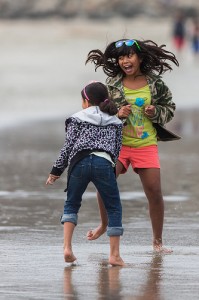One of the highlights of my summer and early fall has been regular trips to the neighborhood park, with our two-year old daughter, Ella.
Just yesterday, she had a great time playing with her best friend at the park, Sharlene (Ella calls her “Sha-Lee”). Sharlene is a fun,

African-American girl who lives a few blocks from us. A few years older than Ella, she can be found most days at the park, playing and making friends. She was the first friend that Ella made all by herself. Her other friends have been “introduced,” by us–children of our adult friends and colleagues. Yesterday, when we left the park, as Ella and Sharlene hugged and blew kisses, a few thoughts went through my mind.
In my Protestant, Baptist context, we hear a great deal about “original sin.” Childhood is often held up as the prime time for selfishness, anger, narcissism, thoughtlessness. I remember a seminary professor once suggesting that God was merciful to keep children small, because if they were large, they would destroy the earth and everything in it–crying all the while. A bit like “Planet of the Apes” gone mad. There are other more obvious (biological) reasons for children being small, but we can leave that for another day.
The ease with which Ella and Sharlene made fast friends and the lack of any sense of social awkwardness or hesitancy, even as they mingled across their families and their own sets of friends, struck me as a powerful counterpoint to the Protestant emphasis on original sin and “total depravity.” (Now don’t get me wrong–we see evidences of that too, on occasion). But it also struck me as an object lesson. Why does it seem so much more difficult for us adults? Why does it seem so hard to move beyond the racist, prejudice impulses that run so deep within us–if buried under a veneer of cordiality and niceties?
It then occurred to me that it won’t always be so easy. As they grow up and are socialized in their various segments of life, voices will chime in from all corners. Some will tell them that it shouldn’t be so easy. Whether at school, at play, or perhaps even at church, at some point they will be confronted with a message which tells them it’s better–simpler–and less troublesome to stick closest to those who look like them, talk like them, and dress like them. That’s a message they will hear. It won’t be nearly as explicit or as institutionalized as it once was. It will be subtle, but it will be there, nonetheless. It will be built into the system somewhere, at some point. And the message will attempt to socialize them in accordance with its values of separation and division in relation to difference, inequality and privilege.
Neither of them will be growing up in Eden. The world they are entering is post-Fall. Sin is pervasive. Satan is lurking. It chills me now even to write those words. But it’s true. It’s also very likely true that Ella will have an easier trek. Knowing just a little of Sharlene’s home life, it’s safe to say that more obstacles will stand in her way. More voices will tell her certain things can’t be done. That certain things can’t be accomplished. That certain opportunities aren’t available to her. It’s sad to write those words, but it feels too true to leave unsaid. These inequalities will compound the challenge of relationships–not just across “racial” bounds, but socio-economic ones as well.
In Genesis 3, what tradition calls the “Fall” story, Adam and Eve take of the fruit of the” tree of the knowledge of good and evil.” They want to be like God, knowing good from evil. I wonder if that’s something of an ironic phrase. What’s wrong with knowing good from evil? Aren’t we supposed to seek wisdom? To do what is right rather than what is wrong? Perhaps the “knowledge of good and evil,” at least that which Adam and Eve grabbed after, isn’t true knowledge at all–but pseudo-knowledge? The sense that we think we know good from evil, when we really don’t. We think we’ve carved up the world just right: into the pure and impure, the good and the bad, what’s possible and what’s not. And so we operate on the basis of that pseudo-knowledge, and on that basis we structure society, pass on culture, and shape our relational lives.
Perhaps the job of the church is, in large part, to spurn that pseudo-knowledge and instead, to “have the mind of Christ,” living on that basis, as “communities of obedience” (Walter Brueggemann) in the light of our advent hope.
Maybe for just a moment–or even for a season–we could mute the voices of our politicians, our intellectuals, our church leaders, and listen to our children.
And Jesus said, “Let the little children come to me, and do not hinder them, for the kingdom of heaven belongs to such as these.” (Matt 19:14)











